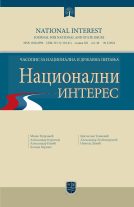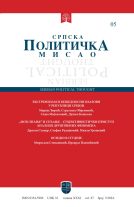- Home page
- Researchers
- Srđan V. Starčević
Srđan V. Starčević
University of Defence in Belgrade, Military Academy

RETURN OF COMPULSORY MILITARY SERVICE IN EUROPE: SOCIAL DETERMINISM AND PERSPECTIVES
In the period between 1995 and 2012, a number of European countries suspended mandatory military service upon which European national standing armies were based, from the 19th to the end of the 20th century. The Second Crimean crisis, which yielded the renewed perception of Russia as a threat to the West, caused a narrative shift regarding military organization in Europe placing public expression of concern for efficiency of its military and its deterrence capability on the public agenda.
The subject of this paper is the analysis of social facts that obstruct political decision-making on military conscription in European societies or hinder the process of reinstating mandatory military service in European countries. The aim is to point out the social determinisms that discourage the introduction of mandatory military service in Europe while favouring the professional military as the basic type of military organization of modern European societies with private military companies as its “subcontractors” and auxiliary forces. The hypothesis proven by the paper is that social changes that took place at the end of the 20th and the beginning of the 21st century shaped modern European societies using dominant social values in contrast to the social values traditionally implied by mandatory military service and conscription. Zygmunt Bauman's theory of fluid modernity was used for the purposes of the paper, supplemented with Giovanni Sartori's theoretical considerations on the rights-claiming society. Hypothetical-deductive and historical-comparative methods were used in the paper.
The introduction explains the conditions under which mandatory military service was introduced in European countries as well as the criticism it faced previous to its suspension. The first chapter is devoted to the analysis of the reasons for reintroducing mandatory military service. In the second chapter, the social facts that resist the return of mandatory military service are analysed. These facts include: decline of power of nation states and redefinition of the concept of sovereignty during globalization, the rise of a type of society that can be called consumerist, atomized, and rights-claiming society, and the shaping of culture with a hedonistic cultural strategy. Social values of modern society are in contrast to social values on which conscription societies counted on: supremacy of the collective over the individual, disciplined repetition of routines, awareness of continuance of the nation as a higher form of shared existence for which a certain absence of comfort must be endured, along with the willingness to make personal sacrifices for the common good.
Based on historical experience, the multipolar world will be a world of military competition and it is expected that many countries will attempt to reintroduce conscription. States which are able to convince their citizens that the danger to the country’s freedom is realistic, will introduce this obligation provided that it takes a looser form than the one that was in force in the last century. Those countries that have suspended the obligation to serve in the military and wish to restore it but fail to convince their citizens of the reality of the threat, will face clear discontent of their citizens.

THE NEED FOR PHILOSOPHY IN THE (POST)MODERN WORLD
To think about essential questions, the meaning of human existence, social-historical and ontological riddles of the World, necessarily means being in the chambers of philosophy. Unfortunately, our (post)modern, globalized and busy world is turning its back on the wisdom of all ages. In this paper, the authors point to the rejection of philosophy in the modern consumer society and search for answers to questions about the need to study philosophy today. Also, about its importance for man, people and humanity. The work consists of three parts, in which a contribution is made to the understanding of the importance of philosophy for man, society and humanity. The authors pointed the reasons for the rejection of philosophy in the modern age are explored, and the relationship between philosophy and science is examined. Philosophy is needed by modern man/society/humanity for the same reasons it was needed in the past, but the need for it is hidden in modern consumer society. Philosophy is eternal and everlasting. If the root of philosophy is about 27 centuries deep and has survived all radical changes in the world and all (r)evolutions, rulers and dynasties, political and social movements, all wars and destructions, all geographical discoveries and the exploring of the Cosmos, is it wise to voluntarily deny such a deep source of wisdom? In contrast to today's consumer lost in his own life, philosophy gives us an insight that can be healing and beneficial. But we should have a fruitful conversation with philosophy, but not just have a historical retrospective. Because we who are still alive need philosophers and their wisdom of the ages. A philosopher looks for the essential and the necessary in everything, and this separates him from those people who deal with unimportant things, phenomena and processes. Of course, a philosophically minded person never underestimates the knowledge and meaning of exact sciences and techniques and technical progress. Communicating with the wisdom of the ages is both healing and valuable and benefits both the individual and the community to which he or she belongs.

JUSTIFICATION OF MILITARY NEUTRALITY OF THE REPUBLIC OF SERBIA AT A TIME OF EROSION OF NEUTRALITY IN EUROPE
This paper aims to examine the justifiableness of the Republic of Serbia’s politics of military neutrality after the beginning of the Russo-Ukrainian conflict, i.e., in an era of extreme tensions between Western countries and Russia. The significance of this topic has been additionally elevated after two neutral countries, Sweden and Finland, renounced neutrality while debates about the appropriateness of neutrality emerged in other neutral countries, such are Ireland, Malta, and Austria. The purpose of the paper is to examine, from a perspective of sociology of politics, whether the position of military neutrality still represents a good foreign-policy strategy aiming to preserve sovereignty and territorial integrity. The hypothesis of this paper is that Serbia’s military neutrality is justified by the social reality in Serbia.
The first chapter briefly describes the historical decline of neutrality during the first half of the 20th century. In that context, observation made in mid last century, according to which neutrality was becoming an obsolete concept, is true. Increase of NATO members, as well as abandoning neutrality under the influence of globalization and negative experiences of neutral countries in the 20th century, strengthens this assertion. However, we can conclude that neutrality has existed in continuity in Europe throughout the entire modern period of history, and that there were always some states that chose neutrality, with larger or lesser prospects of success in realization of their security interests. The great revolution, one might say the collapse of neutrality or even a frenzy to align, was the result of the Russo-Ukrainian conflict and new increasing tensions between the West and Russia.
The second chapter is dedicated to the causes of Serbia’s decision to be military neutral. These causes include: internal division of key political acters in regards to strategic alignment, the issues of the status of Kosovo and Metohija in which the Russian Federation provides key support to Republic of Serbia in the United Nations, and the role of NATO in wars during the disintegration of Yugoslavia and currently in Kosovo and Metohija.
The third chapter lists the advantages in regards to social values implied by the position of military neutrality. Authors conclude that military neutrality represents a favorable strategic option for the Republic of Serbia, not just due to painful collective memory of Serbian citizens of the NATO aggression on Yugoslavia and the support of the Russian Federation to Serbia in regards to Kosovo and Metohija, but also due to the intrinsic values of neutrality which could become an identity attribute and a foundation of the renewal of solidarity in Serbian society.

THE MILITARY SERVICE AS PART OF THE SOCIAL IDEAL IN SERBIA
Compulsory conscription in Serbia was established in the 19th century, and the military as a social institution rapidly became an indispensable part of the socialization process of citizens. It remained so until 2011, which lent credibility to the strategic considerations of deterrence and total defense of that time. The return of war to European soil actualizes the issue of society's readiness for defense in many European countries. Serbian society has changed significantly in the two previous decades, becoming largely described by Bauman's fluid modernity, and the capacity of citizens for armed and unarmed resistance in the event of war has significantly declined. Starting from the assumption that the suspension of the compulsory conscription remains valid, the authors examine the possibilities for increasing the interest of young people in voluntary military service, which is the subject of this paper. The aim of the paper is to show the necessity, justification and content of state incentives for young people who opt for military service, as well as to point out their probable social consequences. The theoretical framework of the work is the theory of the network society of Manuel Castells and his understanding of individuation as a cultural tendency of modern society that differs from individualism. The authors conclude that increasing interest in voluntary military service is possible by connecting individual projects of citizens with military service as part of a common, social ideal in Serbia. State incentives for voluntary military service and, subsequently, participation in the active and passive reserves, could be divided into three groups. The first would be incentives related to employment, the second would be cooperation between the state and civic initiatives and organizations, and the third would be incentives related to business and tax incentives.
